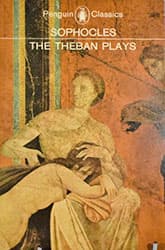Antigone
 Collection, 1965 paperback
Collection, 1965 paperbackFirst performed
441 BCE
Literature form
Play
Genre
Tragedy, mythology
Writing language
Greek
Author's country
Greece
Length
Approx. 21,000 words
Wisdom too late
It's the concluding instalment of Sophocles's so-called Theban trilogy about the tragedy of Oedipus and its ramifications. But Antigone was actually the first written and produced—more than a decade before the supposed lead play, Oedipus Rex. It made its debut alongside two other plays by Sophocles, unrelated to the Oedipus story.
But Antigone is different from the other two Oedipus plays in more ways than in being created before them.
In some ways it's more created than they are. The stories of the king Oedipus and how he got screwed over by fate were well known bits of Greek mythology. The ancient audience probably expected the plot twists of Oedipus Rex, which must have added to the foreordained feelings engendered in the piece. But the story of Antigone, the youngest daughter of Oedipus and Oedipus's wife/mother Jocasta, can be more interesting than the other Theban plays because its story is less well known.
Compared to all that anguishing in Oedipus Rex over the powerlessness of mere mortals before the will of the gods, the themes of Antigone are down to earth. They may resonate more with a modern audience. Sure, fate and prophecy are still important, mostly concerning the role of the Theban monarch, Creon, but characters also make decisions that have intended consequences. Antigone faces questions of how to act in the real world, dealing with the destruction of her parents and brothers. She defies social convention and Creon's commands, seeking a proper burial and mourning for her brother Polynices who had taken up arms against Thebes. She honours gods and family before country, which must have been pretty radical at the time. She sets up divine law, which calls for certain burial rituals, against mortal law, personified by Creon.
Other themes deal with the relation of rulers to their people, filial duty, and the relative values of stubborness and flexibility. It's still dealing with the the big themes in human experience, but it's more about finding a ground to stand on somewhere between absolutes and what today we might call situational ethics.
Offstage bloodbath
Themes are worked out in dialogue among the main characters (always including that Greek chorus), with far less of the gory drama of Oedipus Rex. In any case, most of such developments take place offstage.
To begin with, the battle that leaves Antigone's brothers dead occurs before the first act, and is recounted in stirring fashion by the chorus. Antigone's funeral rites for her brother are also not shown but are reported onstage to Creon by a sentry. Creon sentences Antigone to death over the objections of his son Haemon, who had been engaged to Antigone, but the dire consequences take place out of sight of the audience. It is left to a messenger to report to Creon's wife, Eurydice, an involved sequence of events, including Antigone committing suicide and Haemon trying to stab Creon but killing himself. And of course Eurydice then goes off to kill herself—offstage.
All that dramatic activity that we never get to see! One wonders what Shakespeare would have made of it. Could you imagine Romeo and Juliet without those heartbreaking final scenes, with perhaps only a messenger reporting their deaths to their families? Or news of Hamlet's concluding bloodbath coming to us from secondhand reports?
Different times, different audiences. I don't think the ancient Greek playgoers were any less enthralled by violence in their tragedies than the Elizabethans, but their notion of what was tragic may have been different. Shakespeare is all about the human tragedy, what it means to be flesh-and-blood persons experiencing the vicissitudes of life amid the clash of human personalities. Sophocles's crowd appears most interested in the tragedy that springs from the clash of duties to the nation, to the gods and to one's family.
The gods are angry
While much of the tragic action takes place behind the scenes, the dialogue debates the rights and wrongs in practical terms.
For example, Haemon and others warn Creon against executing Antigone not with panegyrics about love or kinship or the quality of mercy not being strained. He argues the people are worried, the gods are angered and the king's own family will be endangered.
Creon ignores their advice until too late and suffers the predicted consequences. The chorus has the last word, summing up the lesson learned:
Of happiness the crown
And chieftest part
Is wisdom, and to hold
The gods in awe,
This is the law
That, seeing the stricken heart
Of pride brought down,
We learn when we are old.
trans. WE.F. Watling
The tragedy has two wellsprings—in not following the divine laws but also in the fatal flaw of human pride.
Wisdom can be gained through experience, but it comes too late.
— Eric

